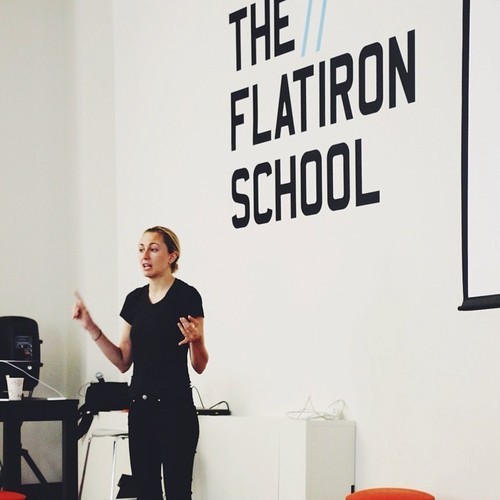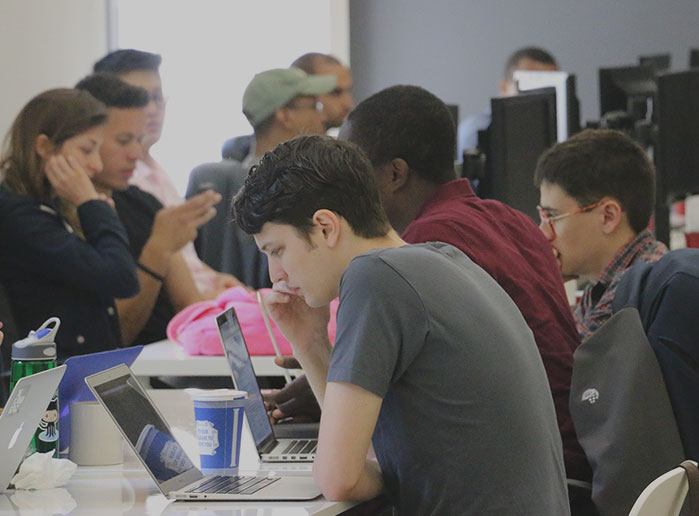Just started coding and thinking of working in tech? Amanda Peyton, founder of gadget marketplace Grand St and now a part of Etsy’s team, has some advice for brand new engineers looking to land their first job. She stopped by Flatiron School to talk through questions she always gets about how to start working in tech. Here’s what we learned:
Big company for structure, startup for speed
If you’re new to tech, and thinking about where to start looking for jobs, look to yourself first. What you want out of your next job should guide your decision—are you the artist who wants to construct something perfect or push features out of the door?
For structure and mentorship: try a bigger company. There will at least be other, more senior people to answer your questions and review your code. There’s also a lot more emphasis on building for the long-term and avoiding technical debt—which will allow you the time to spend learning more about their codebase and perfecting your own work.
Small startups, on the other hand, are more concerned with shipping fast and often, even if it involves duct tape and Band-Aids. If you choose to work at one, you might not have a mentor, but your daily routine will probably be more varied than it would be working on a small feature within a vast and established codebase. If you get into a startup early enough, there will be tons of hard problems to work through independently, and you’ll probably do a little of everything at some point.
Culture fit is really, really important.
Companies don’t expect junior engineers to know everything. They know they’re going to have to invest some time and resources in helping junior talent get better at their jobs. This means a couple things: (1) people interviewing for junior roles don’t have to be experts, but (2) they do have to be a good culture fit.
Culture fit is huge for new engineers, and companies will usually dedicate a lot of interviewing to it. Don’t get overwhelmed when scheduled to meet with 10 people on an interview—this usually means they’re excited about an applicant—but always remember that culture fit goes both ways. Applicants should also be assessing whether or not a company is a good cultural fit for them. It is super important for them to make sure they are going to love working with their potential employers.
Knowing how to learn new skills is even better than having in-demand ones.
It’s not as important as it seems to pick a programming skill based on market demand. Today, in September 2014, demand for developers of every variety is crazy. If you’re really good at something specific like Backbone.js, you can probably find a job doing just that.
But every so often a new technology comes out, and the slate is completely wiped clean. When something changes, everyone, regardless of how much experience they have, is forced to learn something new. New technologies are total equalizers. Perhaps the most valuable, in-demand skill you can have is to be flexible and excited about learning whatever’s next.
That said, demand for mobile developers is huge—so much so that even having smart opinions is valuable. So if you really want to focus on a skill that everyone needs, consider learning a programming language that you can use to build a mobile app.
Get out from behind that monitor and go do stuff.
Building a network means getting to know people in some informal way, so you’re not just that person who is coming in to interview. To get to know people, don’t hesitate to send emails or go to Meetups. Companies throw all kinds of events, so don’t be afraid to just show up and introduce yourself in a pressure-free environment.
It could also be worth it to go to conferences. If you pick one and explore, you’ll not only get a feel for the industry that you wouldn’t normally. You’ll also get to meet people. Who knows? Maybe the person you talk to for five minutes at JS Conf will help you get your next job.
Never miss an opportunity to show attention to detail.
Little details can be really important, and the best way for new engineers to show they care is through doing, not telling. Here’s a good place to start: read a potential workplace’s general or developer blog. Applicants rarely do this, but companies invest a lot of time and thought into their blogs. These can give applicants a sense of a company’s culture and help them show interest outside of an open position.
Not everyone reads cover letters, but new engineers can use projects to demonstrate who they are as people. If you’re showing projects to potential employers, pay attention to detail. Polish them—fix bugs and proofread UI copy. Even without a technical interview, if someone can show craft and effort in their projects, they’re showing they can do the same on the job.
Don’t wait for the technical interview to share what you can bring to a company
In a non-technical interview, be engaged, ask thoughtful questions, and don’t be ashamed of a lack of experience. Research potential employers before an interview and form informed opinions on their products.
Applicants with less experience are often afraid to say things like “here’s what your company needs…” and “here’s what I can do for you…”—but it’s what a lot of interviewers want to hear. Particularly in smaller companies with fewer than 100 people, talking about a problem and actually proposing a thoughtful solution shows initiative, regardless of how much experience someone has.
Right now, tech is filled with opportunities for new coders. No matter if you have three months or three years of experiences, it’s an incredibly dynamic field. It’s not only changing everything, but every new change in tech has the potential to totally level the playing field and get people at all levels of experience learning something new. Who wouldn’t want to be a part of that?
Huge thanks to Amanda for stopping by our campus. You can also find her on Twitter or check out her blog right here.
Written byFLATIRON SCHOOL
Make yourself useful.

